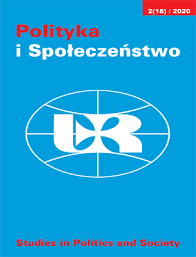THREE DECADES OF RZESZÓW (1989–2018) – ANALYSIS OF SOCIAL CHANGES IN THE CITY
DOI:
https://doi.org/10.15584/polispol.2020.2.8Keywords:
quality of life, social diagnosis, RzeszówAbstract
The article presents the results of empirical research carried out at the Institute of Sociology of the University of Rzeszów in 2009 and in 2018. The research was conducted on representative samples of adults living in Rzeszów (more than 500 people in 2009 and more than 600 people in 2018). The article focuses on the analysis of factors that determine the rank of the city, its position as well as objective and subjective factors of the quality of urban life. An attempt was made to reflect on the most valuable capital determining the future of Rzeszów – its inhabitants. Therefore, their civic activity, social capital, the current perception of the city's problems, its strengths and disadvantages and the various elements that make up the assessment of the quality of life in the city were analyzed. The main focus was on examining selected subjective aspects of the quality of life based on the opinions of the inhabitants of Rzeszów. Therefore, the overall level of satisfaction with the life in the city and the feeling of being able to meet the specific needs of the inhabitants of Rzeszów, the conditions and opportunities offered by the city, the sense of security, the quality assessment of – among others – cultural and educational offer, medical care, and the public transport were all examined. Altogether, these aspects undoubtedly constitute useful material for local governments managing a city which aims to be a metropolis, not only regionally or nationally, and can also serve as useful material for showing the diversity of research subjects and research approaches regarding local government units.
Downloads
Published
How to Cite
Issue
Section
License

This work is licensed under a Creative Commons Attribution-ShareAlike 4.0 International License.


